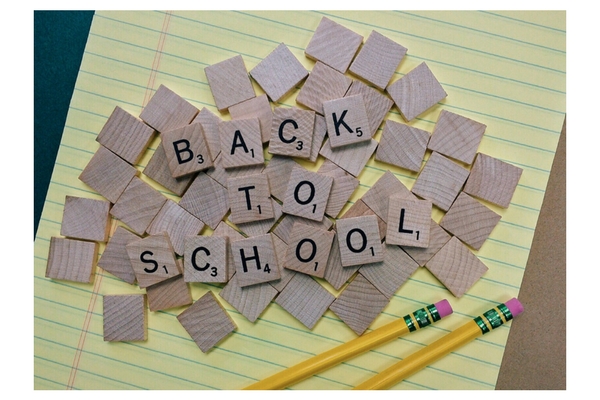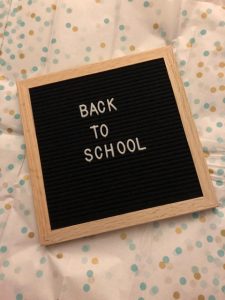
Tips to Help with School Transition
A quick edit to this post for 2023: My kids are teens, both in high school this year (one is beginning, one is graduating) and I have a lot of feelings. BUT these tips actually can still help at all ages! Instead of practicing how to open lunch containers, we may practice how to use a Debit card or open a locker lock…
Good luck parents!
How to make the back to school transition easier for all
I have learned that the back-to-school transition doesn’t always only take a few days. Sometimes it can take weeks or months.
I know this from experience. While my daughter is having no issues being dropped off for JK, my son a number of years ago was a different story. There were some days that I left him at the teacher’s side with tears in his eyes. Other days were fine. Other days we both were crying.
This went on for weeks, and just when we thought we had a good routine, an extended weekend would happen and starting over was tricky.
But we did it. He did it. And we had many many successful days. I do have a few tricks that I’ve learned to help our little ones transition whether it’s the start of preschool or kindergarten.
1- Be excited for them – and show it! (but be honest with everyone’s feelings)
It’s tough to do, but even though each year I’m all ‘DOWN WITH SCHOOL’, I try to talk up some of the positive points in front of the kids while listening and acknowledging what we are all feelings. I don’t want my stresses or worries to be projected. When my son started school, I spoke to him about the excitement that would happen and encouraged a discussion, I didn’t just focus on the worries I had.
It is ok to acknowledge what everyone is feeling. That you will miss each other, that these feelings are perfectly normal for the kiddos and for mom and dad and so on.
Listen to their feelings and words. Really listen.
2- Talk about their day – but get some help
It’s easy to want to know every detail about their time at school but usually the kids answer with ‘it was good’. Or ‘we played’. My kids are most excited to talk about school on the drive home, so I pump as many questions as I can then, because once they are home they aren’t as forthcoming.
But asking leading questions helps. Instead of ‘how was your day?’, if you can ask ‘Which centre did you like best?’ or ‘I heard you went to the library, how was that?’ you might pull more responses, which will lead to positive conversations and hopefully more encouragement to go the following days.
To find out what is happening in the class you can often ask the teacher roughly what the week looks like (they would tell you on Tuesday is library day, Wednesday is gym time etc) or if your child is having a really hard transition, I’ve emailed or phoned teachers to get more specific day to day info to help guide my conversations.
The more we chatted about likes, dislikes, worries etc. The more we were able to help alleviate his concerns.
3- Try this, then that
I used to bring my son early in JK so he got play time. Then it just seemed to make the morning wait too long. His best days were the ones that he basically got there in time to line up. He had no time to worry about saying goodbye to me, or stress, so in he would go and the day was fine.
I also noticed that on days when it wasn’t his teacher’s turn to have duty, he had a harder time. When she was in the yard, he was happy to go to her, otherwise, he wasn’t sure what the plan was. I had to have a back up plan for those days, either waiting with him longer, or suggesting a new teacher he could find.
Another thing that worked was when his teacher saw us arrive for drop off, she would personally walk over and help to bring him into the yard. I appreciated that!
Keep trying different things to see what might help.
4. Practice at home first
Practicing how to do things like hanging up jackets, or opening lunch containers, may help your child reduce their worry about it while at school.
We always made sure lunch containers and water bottles could be opened unassisted by the kids (many won’t ask for help and just won’t eat, or it can be stressful to have a mess if the container bursts open). The same goes for any food that is pre-packaged.
Your child may want to practice putting their lunch kit in their bag (this is when you may discover that the book bag is too small!) and so on.
And finally a few tips for you, dear parent.
This is a big transition for everyone. You and your child are allowed to feel many things. Don’t worry if you are the only one with the sad child at drop off. Or the only one waiting to watch them all go in, or the only one at home feeling sad about this time. I’ve been there.
It gets better and easier for everyone.
A quick tip? Keep busy these first few weeks. I was the worse when sitting at home in silence. I’ve been keeping busy with friends and errands and coffee dates. Once you find your new groove, and see how happy your child is, the transition will be easy as pie.
Remember that each child is different (as my own kids have shown me) and that sometimes, it just takes time. And chances are, once you leave at drop off they will really love school!
ps: This back to school check list may help!




